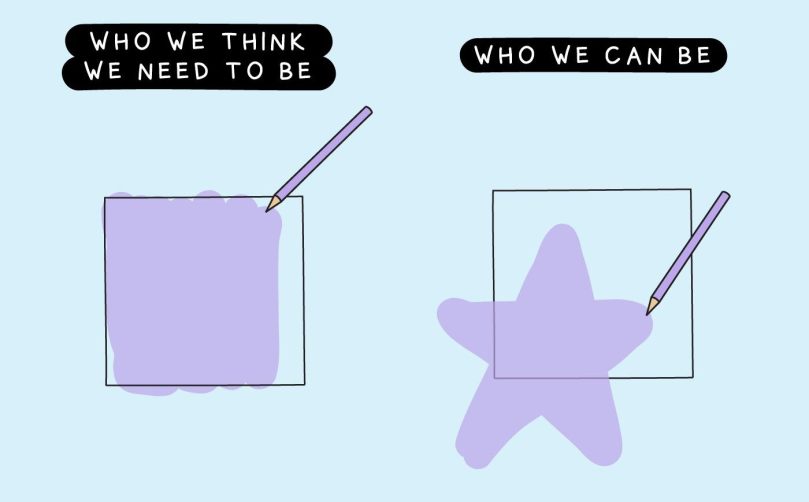[Image by Liz Fosslien]
I spent large parts of my corporate career trying to fit in.
I quickly decided that fitting in meant only using the parts of me that others understood and valued. Typically this was tangible stuff; logic, facts, figures, measures, processes. When I drew on other parts (my intense curiosity about people, what makes them tick and why it is important) I would sense discomfort, confusion, sighs from those around me.
In order to belong, I told myself, I had to focus on what was accepted and ignore the rest. The effort was exhausting.
Some clients describe having a work persona; stepping in to a different way of being in order to succeed at work. This is usually something that has developed over time and has worked well.
The trouble is, they are tired.
To others, they are respected, intelligent leaders. But they know they’ve reached a limit. Doing more of the same isn’t going to do it. They know there is more within them.
Why is fitting in important?
We are programmed to want to fit in because standing out is scary.
Fitting in is associated with belonging and we equate belonging with safety and protection (both physical and psychological).
Standing out means making yourself vulnerable. It feels risky and unsafe.
- What if they don’t like me?
- What if I’m wrong?
- What if I am not (good) enough?
So it’s unsurprising that many of us want to move towards belonging and away from vulnerability. The trouble is, we also tell ourselves that, in order to belong, we have to fit in. But when fitting in means we’re not being fully ourselves, we still don’t find the belonging we seek. Quite the conundrum!
The good news
Fortunately, standing out needn’t be scary. When we are in-tune with what’s most important to us (our values) and able to accept and appreciate who we really are; with all our faults and imperfections; standing out can feel quite natural.
Drawing on parts we’ve previously ignored, distrusted or suppressed offers more creativity, energy and resourcefulness to deal with new challenges.
Being clear about how we see ourselves means we are not so reliant on others’ perceptions of us because we are clear about how we see ourselves.
And, ironically, we are more likely to be accepted and feel belonging when we show up fully. When we shed the “work persona” (or mask or armour), people can see and connect with who we really are rather than who we’re trying to be.
So perhaps the secret of belonging is being prepared not to fit in; being prepared to stand out by being and trusting yourself and knowing you are enough.


